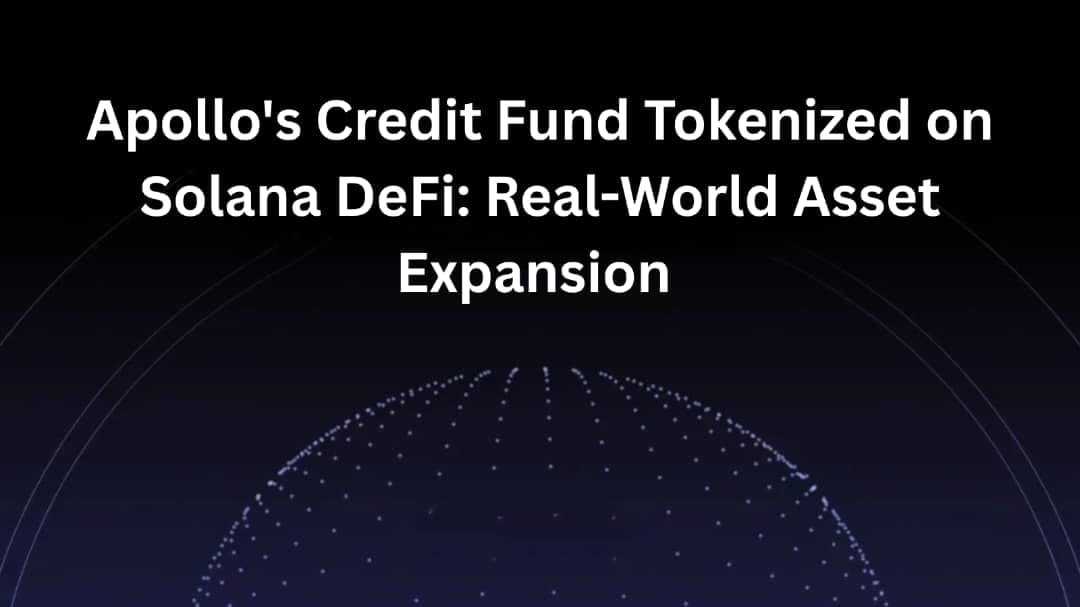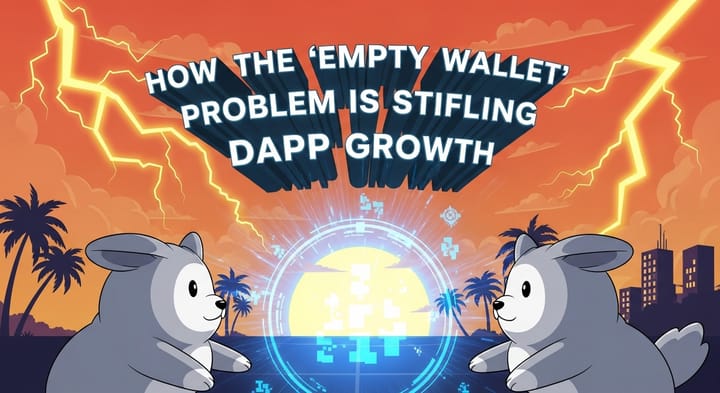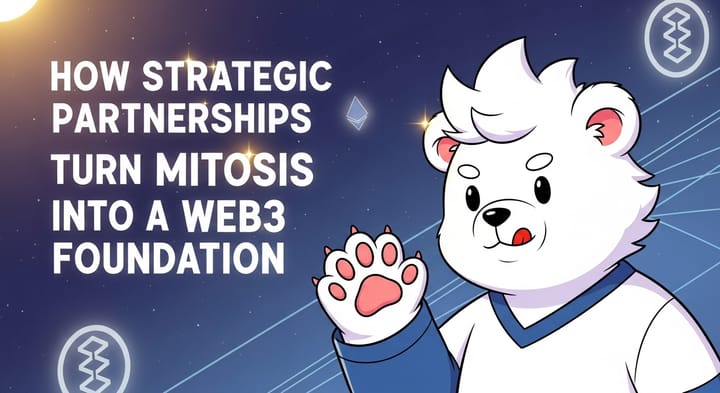Apollo's Credit Fund Tokenized on Solana DeFi: Real-World Asset Expansion

Introduction
The financial landscape is undergoing a seismic shift as the tokenization of real-world assets (RWAs) gains traction, particularly within the realm of decentralized finance (DeFi). One of the most notable developments in this space is Apollo Global Management's launch of its tokenized credit fund, ACRED, on the Solana blockchain. This initiative not only exemplifies the growing intersection of traditional finance and blockchain technology but also highlights the potential for increased liquidity, accessibility, and democratization of investment opportunities. In this article, we will explore the trends in RWA tokenization, the significance of Apollo's ACRED, and the broader implications for both DeFi and traditional finance.
1. Understanding Real-World Asset Tokenization
1.1 Definition and Overview
Real-world asset tokenization refers to the process of converting physical or intangible assets into digital tokens on a blockchain. This transformation allows for fractional ownership, easier transferability, and enhanced liquidity. Tokenization can encompass a wide range of assets, including:
- Real Estate: Properties can be tokenized to allow multiple investors to own a fraction of a property, making real estate investment more accessible.
- Commodities: Physical commodities like gold or oil can be tokenized, enabling easier trading and investment.
- Private Credit: Loans and credit instruments can be tokenized, allowing investors to participate in private lending markets that were previously inaccessible.
1.2 Market Growth and Trends
The market for tokenized assets is rapidly expanding, driven by several key factors:
- Increased Liquidity: Tokenization enhances liquidity by allowing assets to be traded on secondary markets, making it easier for investors to buy and sell.
- Transparency: Blockchain technology provides a transparent and immutable record of ownership, reducing fraud and increasing trust among investors.
- Democratization of Investment: Tokenization lowers the barriers to entry for investors, allowing smaller investors to participate in markets that were previously dominated by institutional players.
2. Apollo's Tokenized Credit Fund: ACRED
2.1 Launch Overview
Apollo Global Management, one of the largest asset managers in the world with over $785 billion in assets under management, has launched ACRED, a tokenized version of its private credit fund. This fund focuses on private credit strategies, providing investors with exposure to corporate lending and asset-backed securities.
2.2 Investment Strategy
ACRED aims to provide investors with access to a diversified portfolio of private credit investments, which typically involve lending directly to companies. These investments often yield higher returns compared to traditional fixed-income securities, but they also come with increased risk. By tokenizing ACRED, Apollo seeks to broaden access to private credit investments, allowing smaller investors to participate in a market that has historically required significant capital and connections.
Tokenization Benefits
The tokenization of ACRED offers several advantages:
- Fractional Ownership: Investors can purchase fractions of ACRED tokens, lowering the minimum investment threshold and making it accessible to a wider audience.
- Enhanced Liquidity: Tokenized assets can be traded on secondary markets, providing investors with greater flexibility and the ability to exit their investments more easily.
- Transparency and Security: The use of blockchain technology ensures that all transactions are recorded transparently, reducing the risk of fraud and enhancing investor confidence.
3. The Role of Solana in RWA Tokenization
3.1 Blockchain Features
Solana is a high-performance blockchain known for its scalability and low transaction costs. These features make it an ideal platform for tokenized securities, enabling efficient trading and interaction with other DeFi protocols. Key characteristics of Solana include:
- High Throughput: Solana can process thousands of transactions per second, making it suitable for high-frequency trading and real-time applications.
- Low Fees: The low transaction costs on Solana facilitate microtransactions, which are essential for tokenized assets that may have lower price points.
3.2 Institutional Confidence
The deployment of ACRED on Solana signals a growing acceptance of blockchain technology among institutional investors. As major financial players like Apollo embrace blockchain solutions, it may lead to increased capital inflows into the DeFi space. This institutional confidence can further legitimize the use of blockchain for tokenized assets and encourage more traditional financial institutions to explore similar initiatives.
4. Bridging Traditional Finance and DeFi
4.1 Integration of RWAs
The incorporation of RWAs into DeFi represents a significant step towards bridging the gap between traditional finance and decentralized finance. By allowing traditional assets to be utilized within decentralized protocols, the utility and accessibility of these assets are enhanced. This integration can lead to several benefits:
- Increased Capital Efficiency: Tokenized RWAs can be used as collateral in DeFi lending protocols, allowing investors to unlock liquidity without selling their assets.
- Diverse Investment Opportunities: Investors can access a broader range of investment strategies that combine traditional assets with innovative DeFi solutions.
4.2 Investment Strategies
Investors can leverage RWAs for various strategies within the DeFi ecosystem, including:
- Yield Farming: Investors can stake their tokenized assets in DeFi protocols to earn rewards, enhancing their overall returns.
- Collateralized Borrowing: Tokenized RWAs can be used as collateral to secure loans in DeFi platforms, providing liquidity while retaining ownership of the underlying asset.
5. Leveraged Yield Strategies with Kamino Finance
5.1 Partnership Overview
Kamino Finance is a DeFi protocol that focuses on providing leveraged yield strategies. In collaboration with Securitize, Kamino Finance is set to offer leveraged yield strategies using ACRED tokens. This partnership aims to amplify returns for investors while managing risk.
5.2 Mechanics of Looping
The leveraged yield strategy involves a process known as "looping." This strategy allows investors to deposit ACRED tokens, borrow against them, and reinvest the borrowed funds to generate additional returns. The mechanics of looping can be summarized as follows:
- Deposit: Investors deposit their ACRED tokens into the Kamino Finance protocol.
- Borrowing: Investors can borrow a percentage of the value of their deposited tokens, creating leverage.
- Reinvestment: The borrowed funds can be reinvested into other DeFi protocols or strategies, potentially generating higher returns.
While looping can enhance returns, it also increases risk exposure. Investors must carefully consider the potential for liquidation if the value of their collateral decreases.
6. Regulatory Landscape and Compliance
6.1 Securitize Framework
ACRED is issued under Securitize’s regulated token framework, which includes features for investor identity verification and compliance with legal standards. This regulatory compliance is crucial for attracting institutional investors who require assurance that tokenized assets operate within established financial regulations.
6.2 Importance of Regulation
The evolving regulatory landscape for tokenized securities presents both challenges and opportunities. Key considerations include:
- Regulatory Clarity: Clear regulations can provide a framework for the issuance and trading of tokenized assets, fostering investor confidence.
- Compliance Costs: Adhering to regulatory requirements can increase costs for issuers, potentially impacting the viability of tokenization projects.
- Investor Protection: Regulations can help protect investors from fraud and ensure that tokenized assets meet certain standards of quality and transparency.
7. Challenges and Risks in RWA Tokenization
1. Regulatory Uncertainty
The regulatory environment for tokenized securities is still developing, and uncertainty can hinder widespread adoption. Different jurisdictions may have varying regulations, making it challenging for projects to navigate compliance.
2. Liquidity Concerns
While tokenization can enhance liquidity, the underlying private credit assets remain inherently illiquid. The development of secondary markets for tokenized RWAs is essential to ensure that investors can buy and sell their assets easily.
3. Smart Contract Vulnerabilities
Engaging with DeFi protocols introduces risks associated with smart contracts. Bugs and exploits in smart contracts can lead to significant financial losses for investors. It is crucial for projects to conduct thorough audits and implement robust security measures.
4. Market Dynamics
The performance of ACRED is tied to the underlying private credit investments, which carry their own risks, including credit risk and interest rate risk. Investors must be aware of these risks when considering investments in tokenized credit funds.
8. Future Implications for DeFi and Traditional Finance
1. Capital Inflows
The launch of ACRED on Solana represents a significant step towards integrating traditional finance with DeFi. As more institutional players enter the space, it could lead to new capital inflows and investment opportunities. This influx of capital may further legitimize the use of blockchain technology in finance.
2. Broader Asset Classes
As more RWAs are tokenized and brought onto blockchain platforms, the DeFi landscape may evolve to include a wider range of asset classes. This diversification can enhance stability and attract mainstream users, ultimately leading to a more robust and resilient financial ecosystem.
3. Innovation in Financial Products
The integration of RWAs into DeFi can spur innovation in financial products and services. New investment strategies, risk management tools, and liquidity solutions may emerge as the market matures, providing investors with more options and opportunities.
Conclusion
The tokenization of real-world assets, exemplified by Apollo's ACRED fund on Solana, represents a transformative development at the intersection of traditional finance and decentralized finance. As the market for tokenized assets continues to grow, ongoing advancements in regulatory frameworks, liquidity solutions, and technological innovations will shape the future of RWA DeFi. The potential for increased accessibility, transparency, and efficiency in investment opportunities is immense, paving the way for a new era in finance.
Resources for Further Reading



Comments ()